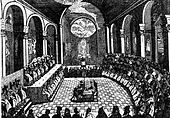
Back Zweites Konzil von Lyon ALS مجمع ليون الثاني Arabic مجمع ليون التانى ARZ Conceyu de Lyon II AST Другі Ліёнскі сабор Byelorussian Втори лионски събор Bulgarian Concili de Lió II Catalan Druhý lyonský koncil Czech Zweites Konzil von Lyon German Δεύτερη Σύνοδος της Λυών Greek
| Second Council of Lyon | |
|---|---|
| Date | 1272–1274 |
| Accepted by | Catholic Church |
Previous council | First Council of Lyon |
Next council | Council of Vienne |
| Convoked by | Pope Gregory X |
| President | Pope Gregory X |
| Attendance | 560 (bishops and abbots) |
| Topics | Conquest of the Holy Land, Great Schism, filioque, conclaves |
Documents and statements | Approval of Dominicans and Franciscans, apparent resolution of the Great Schism, tithe for the crusade, internal reforms |
| Chronological list of ecumenical councils | |
| Part of a series on the |
| Ecumenical councils of the Catholic Church |
|---|
 |
| 4th–5th centuries |
| 6th–9th centuries |
| 12th–14th centuries |
| 15th–16th centuries |
| 19th–20th centuries |
|
|
The Second Council of Lyon was the fourteenth ecumenical council of the Roman Catholic Church, convoked on 31 March 1272 and convened in Lyon, Kingdom of Arles (in modern France), in 1274.[1] Pope Gregory X presided over the council, called to act on a pledge by Byzantine emperor Michael VIII to reunite the Eastern church with the West.[2] The council was attended by about 300 bishops, 60 abbots[3][better source needed] and more than a thousand prelates or their procurators, among whom were the representatives of the universities. Due to the great number of attendees, those who had come to Lyon without being specifically summoned were given "leave to depart with the blessing of God" and of the Pope. Among others who attended the council were James I of Aragon, the ambassador of the Emperor Michael VIII Palaiologos with members of the Greek clergy and the ambassadors of Abaqa Khan of the Ilkhanate. Thomas Aquinas had been summoned to the council, but died en route at Fossanova Abbey. Bonaventure was present at the first four sessions but died at Lyon on 15 July 1274. As at the First Council of Lyon, Thomas Cantilupe was an English attendee and a papal chaplain.[4]
In addition to Aragon, which James represented in person, representatives of the kings of Germany, England, Scotland, France, the Spains and Sicily[5] were present, with procurators also representing the kingdoms of Norway, Sweden, Hungary, Bohemia, Poland, and the "realm of Dacia". In the procedures to be observed in the council, for the first time the nations appeared as represented elements in an ecclesiastical council, as they had already become represented in the governing of medieval universities. This innovation marks a stepping-stone towards the acknowledgment of coherent ideas of nationhood, which were in the process of creating the European nation-states.
The main topics discussed at the council were the conquest of the Holy Land and the union of the Eastern and Western Churches. The first session took place on 7 May 1274 and was followed by five additional sessions on 18 May 1274, 4 or 7 June 1274, 6 July 1274, 16 July 1274, and 17 July 1274. By the end of the council, 31 constitutions were promulgated. In the second session, the fathers approved the decree Zelus fidei, which contained no juridical statutes but rather summed up constitutions about the perils of the Holy Land, the means for paying for a proposed crusade, the excommunication of pirates and corsairs and those who protected them or traded with them, a declaration of peace among Christians, a grant of an indulgence for those willing to go on crusade, restoration of communion with the Greeks, and the definition of the order and procedure to be observed in the council. The Greeks conceded on the issue of the Filioque (two words added to the Nicene Creed), and union was proclaimed, but the union was later repudiated by Andronicus II,[2] heir to Michael VIII. The council also recognized Rudolf I as Holy Roman Emperor, ending the interregnum.[2]
- ^ "Gregory X convoked the general council on 31 March 1272...outlined three themes: union with the Greeks, the crusade, and the reform of the church. Regarding the third theme, which was not only traditional in medieval councils but was also required by the actual state of ecclesiastical morals, the pope in March 1273 sought the opinion of all christian people and asked for their help. After long preparatory arrangements the council assembled at Lyons and opened on 7 May 1274...The Greeks arrived late, on 24 June 1274, since they had been shipwrecked...The council had 6 general sessions: on 7 May 1274, 18 May 1274, 4 or 7 June 1274, 6 July 1274, 16 July 1274, and 17 July 1274. (from Papal Encyclicals.net, accessed 23 January 2012)
- ^ a b c Wetterau, Bruce. World history. New York: Henry Holt and company. 1994 [page needed]
- ^ Papal Encyclicals.net
- ^ Oxford Dictionary of National Biography
- ^ The Sicilian representation was that sent by Charles of Anjou, whom the Papacy had placed on the throne of Sicily in 1266, to the detriment of Aragonese claims. The uprising in Aragon's favour called the Sicilian Vespers would take place 30 March 1282.
© MMXXIII Rich X Search. We shall prevail. All rights reserved. Rich X Search